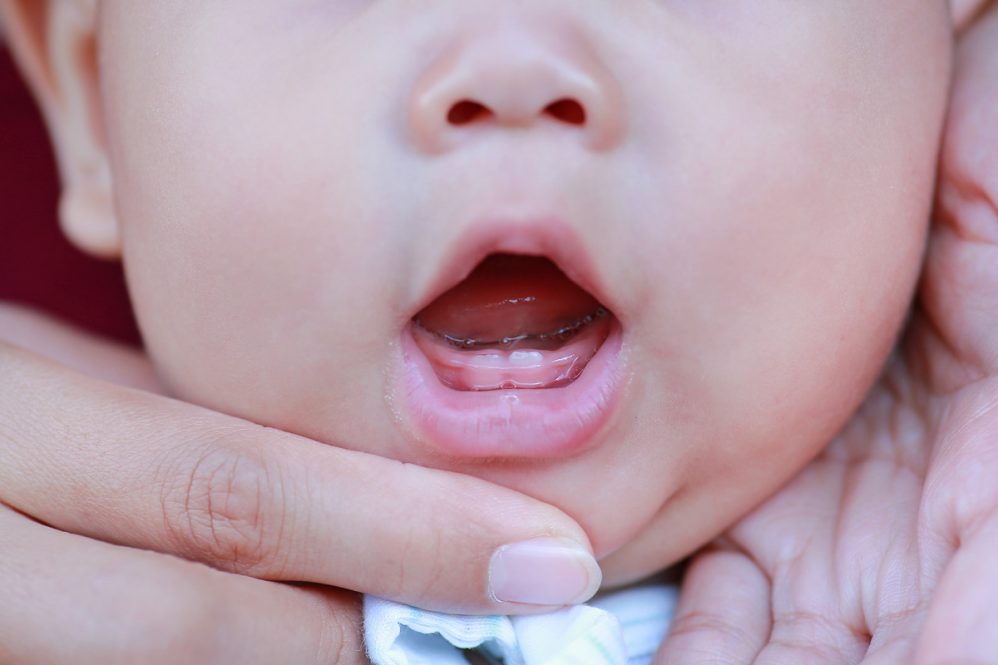
In honor of National Children’s Dental Health Month, Dr. Katherine Fleming, assistant professor of pediatric dentistry, answers the top questions from parents of infants and toddlers.
When should an infant/toddler first seek dental care?
It is recommended that all children see the dentist once their teeth start to erupt and by their first birthday. During the first visit, our goal is to establish a relationship with the patient and family. The dentist will review and offer guidance on diet, habits, oral hygiene, teething and how to prevent cavities and other dental problems. These early visits also help familiarize children and parents with the dental office and what to expect at visits moving forward.
When should you begin brushing teeth? Frequency? What are the best methods?
Parents should start brushing their children’s teeth as soon as they appear in the mouth. We recommend using a tiny smear of fluoridated toothpaste that is about the size of a grain of rice. We have solid research that shows the positive effects of this very small, safe amount of fluoride on teeth as soon as they erupt. Soft, nylon-bristled toothbrushes are best to remove plaque. Infant toothbrushes have small heads that are easier to use in a tiny mouth.
Are pacifiers and thumb sucking harmful for oral development? Should you wean at a certain age?
There are numerous benefits to non-nutritive sucking habits for young infants. Most children stop these habits on their own. However, as children get older, sucking habits on a pacifier, finger, thumb or other object can influence oral development. For instance, prolonged sucking habits can cause a variety of issues including a narrowed upper jaw, an “open bite” where the top teeth do not overlap the bottom teeth in the front when a child bites down or a “crossbite” in the back where the top back teeth are narrower than the bottom back teeth. Prolonged sucking habits can also lead to the top front teeth flaring out. Typically, we recommend trying to end these habits by age 3. In most cases, when children stop by this age, their teeth and oral structures are able to adjust and we are less likely to see long-term effects.
How should I handle teething for my baby?
Most babies begin teething somewhere around 6 months of age but there is a wide range of normal. Typically the bottom front teeth are the first to come in. It’s not unusual for your child to be irritable or fussy when new teeth erupt. Additionally, you might notice excess saliva or drooling. Cold temperatures can help ease pain so you can give your baby a clean teething ring that has been chilled in the refrigerator or even a cold, wet, clean washcloth to chew on. You can also rub your child’s gums with a clean finger. Avoid numbing gels for teething as they can be dangerous if too much is used.
Do I need to clean my baby’s mouth before he/she has teeth?
Yes, it’s important to gently clean your baby’s gums after feeding, even before the teeth come in. The easiest way to do it is to cradle your baby in one arm. With the other hand, hold a baby toothbrush or a wrap a moist warm washcloth around one finger. Gently massage the baby’s gums with the toothbrush or cloth.
At what age do children start getting cavities/tooth decay?
Children can start to get cavities as soon as the teeth are erupted in the mouth. The bacteria that cause tooth decay can easily spread between an adult and a baby. Don’t put anything in your baby’s mouth that has been in your (or another adult’s) mouth. Cavities require sugars or carbohydrates to grow, so don’t put your baby to bed with a bottle of milk, juice, soda or anything sweet. Often, the first sign of tooth decay on baby teeth are chalky white spots. If you see these on your child’s teeth, we recommend seeing a dentist right away.
UConn Health pediatric dental residents Dr. Erin Dwyer and Dr. Laura Borodic contributed to this article.



